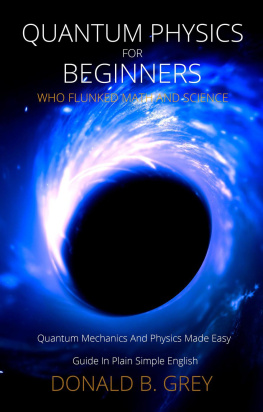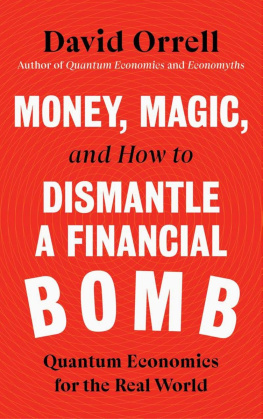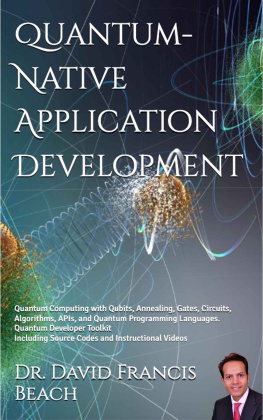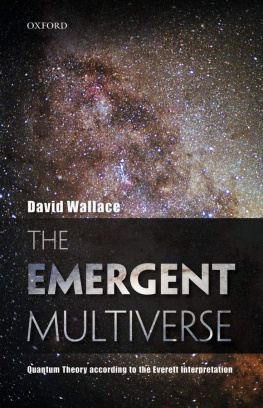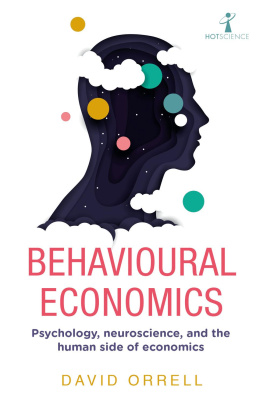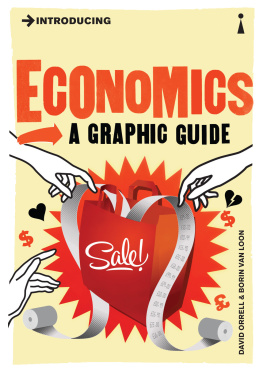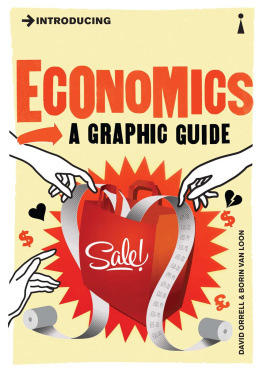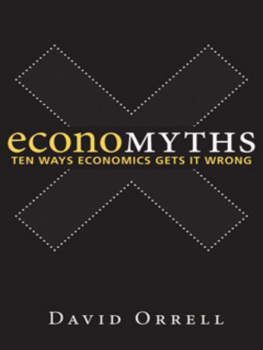Praise for Quantum Economics
The word quantum means how much. Orrell proposes that money is literally a quantum phenomenon that entangles us in relationships not dissimilar to the particle entanglements of the subatomic domain. Here credit and debit constitute a waveparticle-like duality enmeshing us all in a quantum-weave. Beautifully written, inherently ethical, and often hilarious, this book is a must-read for anyone wanting to understand the weird, and getting weirder, world of modern finance.
Margaret Wertheim, author of Pythagoras Trousers and The Pearly Gates of Cyberspace
As money becomes more digital and diffuse, it also becomes more quantum. In this timely and illuminating book, David Orrell brings us to the frontier of where economics, physics and psychology intersect. Youll never look at money the same again!
Dr Parag Khanna, author of Connectography: Mapping the Future of Global Civilization
Reading David Orrells Quantum Economics is equivalent to playing a game of 3-D chess against the concept of value itself. The book easily switches between physical, economic and metaphysical conceptions of value, revealing their hidden parallels and paradoxes. The result is at once an explanation of our current economic predicament, a diagnosis of how we got there and a credible guide to the sort of out of the box thinking that is likely to get us out of it. After youve forgotten about the latest wheeze about the financial crisis, youll be returning to this book.
Steve Fuller, Auguste Comte Chair in Social Epistemology, University of Warwick, and author of Post-Truth: Knowledge as a Power Game
Rich with suggestive insights on every page and written in an accessible style, this book will both engage and infuriate its audience. For those of us who feel trapped in the professional cocoons of the like-minded, this book offers a chance to escape from the iron cages we have built.
Peter J. Katzenstein, Walter S. Carpenter, Jr. Professor of International Studies, Cornell University
Forty years ago, I wrote a paper noting in analogy to quantum physics, the order of determining the price and demand for a commodity would change the quantities determined. It is delightful to see a book devoted to exploring another analogy to quantum physics for economics, that money exists in a dual way.
Orrell has explained his ideas in a very lively style, providing the history and a basic explanation of the physics; and goes on to explore the various consequences of this dual nature, which neo-classical economics did not foresee. The book should be read, not only by economists but also by all decision-makers.
Asghar Qadir, Professor of Physics, National University of Science and Technology, Pakistan
On the cusp of an earlier revolution, Karl Marx said all that is solid melts into air and all that is holy is profaned. Constructing a less mechanistic and even more revolutionary science of quantum economics, David Orrell proves it so. Orrell does not dabble in metaphor or metaphysics: he intellectually, persuasively and corrosively transmutates money into a quantum phenomenon. In the process, classical economics is profaned to good effect and a quantum future glimmers as a real possibility.
James Der Derian, Chair of International Security Studies, University of Sydney
Praise for Economyths
A fascinating, funny and wonderfully readable take down of mainstream economics. Read it.
Kate Raworth, author of Doughnut Economics
This is without doubt the best book Ive read this year, and probably one of the most important books Ive ever read Orrell exposes the rotten heart of economics [S]hould be required reading for every politician and banker. No, make that every voter in the land. This ought to be a real game changer of a book. Read it.
Brian Clegg, www.popularscience.co.uk
Lists 10 crucial assumptions (the economy is simple, fair, stable, etc.) and argues both entertainingly and convincingly that each one is totally at odds with reality. Orrell also suggests that adopting the science of complex systems would radically improve economic policymaking.
William White, former Deputy Governor of the Bank of Canada (Bloomberg Best Books of 2013)
His background allows Orrell to reliably and convincingly question the claim of economics to quasi-scientific objectivity and mathematical accuracy, and expose it as a sales ploy.
Handelsblatt (Germany)
Consistently interesting and enjoyable reading A wide audience including many non-economists could benefit from reading it.
International Journal of Social Economics
His ten economic myths should be committed to memory.
Monthly Review (US)
[Orrells] tone is engagingly curious, drawing on biology and psychology, and his historical view spans more than merely the past few decades. Orrell recommends an interdisciplinary approach to a new economics, in which ethics and complexity theory might have a say.
The Guardian (UK)
Required reading for anyone who deals with the economy.
Obserwator Finansowy (Poland)
I urge you all to read [this book]
New Straits Times (Malaysia)
A book that can help you appreciate economics in action, and also help make it less of a voodoo science.
Business Line (India)
A book full of intellectual stimulation.
Toyo Keizai (Japan)
One of the best books Ive read this year.
Pressian (Korea)
Highly readable and a great introduction to the dynamic thinking used in many natural sciences.
The Post-Crash Economics Society (UK)
Read this book!
Indonesian Society for Social Transformation
Terrible, willfully ignorant, deeply anti-intellectual there is nothing an interested layman could possibly learn from this book.
Professor of economics, University of Victoria
Just random sort of like Malcolm Gladwell without the insight.
Professor of economics, Carleton University
Must be good as Ive had hate mails from economists for writing a positive review of it.
Brian Clegg
Praise for Truth or Beauty
Fascinating Orrell is an engaging and witty writer, adept at explaining often complicated theories in clear language.
Ian Critchley, Sunday Times
Praise for The Money Formula
(with Paul Wilmott)
This book has humor, attitude, clarity, science and common sense; it pulls no punches and takes no prisoners.
Nassim Nicholas Taleb
Praise for The Evolution of Money
(with Roman Chlupat)
Perhaps the best book on money I have ever read A reasonable and benign dictator might demand that those engaged in activities relating to economic management should, as a condition of employment, be compelled to read The Evolution of Money and pass a written examination based on an understanding of its contents.
Colin Teese, former deputy secretary of the Department of Trade, News Weekly (Australia)
Praise for Soumrak homo economicus
(The Twilight of Economic Man, with Tom Sedlek and Roman Chlupat)
The reader has the sense of being a silent guest at a smart table talk in which earth-shattering things are discussed.
Die Welt (Germany)
For James, Vera, and Lenny
C ONTENTS
You never change things by fighting the existing reality. To change something, build a new model that makes the existing model obsolete.
R. Buckminster Fuller
If there be nothing new, but that which is Hath been before, how are our brains beguild, Which, labouring for invention, bear amiss The second burthen of a former child!

![David Orrell [David Orrell] Quantum Economics](/uploads/posts/book/114631/thumbs/david-orrell-david-orrell-quantum-economics.jpg)
